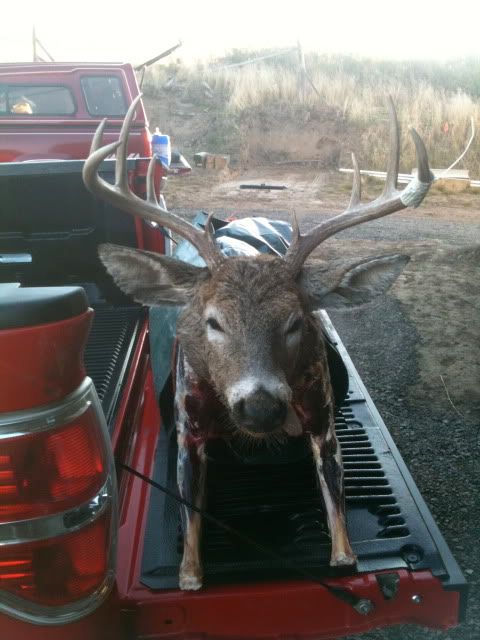Bagging A Five Point Buck In The Palouse
October 23, 2010
The reason why haven’t blogged for the last week or so is that I have been deer hunting. It was a successful trip and I had a great time doing a little ‘live tissue training’. lol
This trip was special for me because I got to be with my father and uncle for a hunt I used to do when I was younger. Work has gotten in the way of me doing this hunt for a long time, and my schedule this year finally produced a window for something like this. Plus, hunting in the Palouse is special unto itself.

A good shot of the rolling hills and wheat country of the Palouse.
The Palouse is a region of Southeast Washington State that is defined by lots of wheat fields mixed with steep and rocky cliffed river valleys and patches of forest eyebrows. These eyebrows are basically areas of wheat fields that cannot be tilled and are used by deer in the area to bed down. The river valleys have cliffs and steep edges, with lots of gullies and areas where deer can hide. They are lush areas and can be very interesting to hunt.
For this trip, I had to buy a bunch of new equipment and square away my rifle. That meant lots of trips to the gun stores and the local Cabelas here in Boise. I had fun doing this, and Boise is definitely a hunter’s town.
I also rented a 2010 Ford F150 from a rental car place(the flex fuel model), and I abused the crap out of this vehicle. It was used for the trip to the Palouse from Boise and back, and it was used for all the wandering around in the wheat country and river valleys. It was also used to haul out deer, cross rivers, climb steep hills, and even tow a deer off of a cliff edge.
So after getting my gear, rifle and truck assembled, I headed on out to the town we stay in. I was to link up with my father and uncle there and it was about a 8 hour trip from Boise. I pulled into the town in the afternoon.
The camp we were to call home was a garage that was converted into a hunting lodge of sorts. Inside was lots of deer horns, a wood stove, power, and enough space for us to set up some tables and chairs to eat at and hang out.
That night we prepared for hunting and talked shop with the local farmers, and the various land owners and farmers/ranchers/hunters of the area that stopped by. It was great fun to touch base with all of these folks, and everyone was excited for opening day the next morning. (a big shout out to Tim for being such a great host and hunting guru)
The first day we started hunting, I probably hit a record for observing the most amount of deer in one day. The problem was that our party couldn’t get a shot at anything shootable. The deer have to be three pointers, or have three tines on one horn to include the eye guards. Anything less than a three point and you could be heavily fined.
Opening day sounds like a war zone. There are gun shots going off all over the place, and guys are slinging large rifle calibers all over the place. This is why wearing hunter orange vests is required, because you definitely do not want to be accidently shot by any of the dozens of hunters scattered throughout the area. I also thought to myself if a hunter orange plate carrier might have some interest to some folks? Who knows, and maybe someone is already selling such a thing?

The cliff area I was hunting.
The next day is when I got my deer. I was up on cliff edges above the river doing some glassing (using binoculars) and decided to try and get lower on the stepped edges of the cliff. I definitely had to be careful doing this, and find an access point that was safe enough. But these stepped areas of the cliff edges are where the big Whitetail deer like to hang out, and especially the bucks, so it is worth the effort.
Over the years, our hunting party has taken quite a few bucks in the cliff areas of the Palouse. Most hunters of the area will not go up there because getting a deer there requires a lot of work to get out, and it is just tough hunting. But those cliffs are where the big guys like to hang, to include the one I got.
How I got him was an interesting story. As I was crawling down, I heard some noise in the bushes below me and a two point buck popped out. I raised the rifle on him and looked at his horns to identify how many he really had. You look for little nubs on the eye guards, or any kind of growth on the horns to give you any indicators for a shot. But nothing on this guy’s horns would indicate a three point, so I had to let him go. I notified my uncle via a small Motorola ‘talk-about’ radio we use, that this deer was heading his way.
So as I was going down the slope, I was looking for another point to glass from. I found a good edge and was able to start glassing again. It was a great spot because it allowed me to look at the cliffs around me with a better angle. It also shortened up my range if I had to shoot into the river valley. I had a Nikon range finder at the time, and most of my shots would have been in the 200 to 300 yd range. Perfect for the rifle I had set up.
Then while I was glassing and talking with my father on the radio about another doe we spotted, I had heard some noise in the brush from where the two point buck came out of. I brought my rifle up again and had to move closer to it in order to see what it was. To my astonishment, it was another buck that decided to get up. This guy was definitely shootable and big, and was holding tight in his little hiding spot. I had to shoot quick because he was getting ready to bolt, and I popped him dead on in the chest at about 36 yds.(he walked a little from his position, and then was squared up facing me when I shot).

The five point buck I shot up on the cliffs.
The shot thwacked him in the chest and he went down immediately. He then rolled down the slope and I put my safety back on the rifle to go after him. Basically, I had to follow him over the cliff edge and through the ravine that he was rolling down. Luckily he was going down a ravine that was passable and I felt I could do it safely.
As I came up on him, I poked his eyeball to make sure it was dead. You always dead check these things because a wounded animal with horns can certainly hurt you. This guy was dead and it was a good clean shot. The 185 grn. bullet entered the chest and stayed in the body. The bullet did reach the right side tenderloin and was a little screwed up–but not bad.
From that point on I had to plan on how to get the deer out of there. I unloaded my rifle and slung it on my back and took some clothing off so I did not overheat. I then dragged the animal down the slope with gravity being my friend. The thing felt like it weighed about 190 lbs.
Once at the bottom of the slope I came across the river that the cliff was overlooking. On the banks of the river, I gutted the deer and washed him out in the river. The river is also what I used to float the deer to a pick up point for my vehicle. (After shooting the deer, I notified my father and uncle to go get the pick up and meet me below to pick up the deer.)
This next part of the deer hauling process was interesting as well. I had two choices for dragging the deer. Drag it across the river and over land for about 300 yds, or float the body down the river a ways and drag it up the banks to a pick up point for the vehicle, which would make my drag just 30 yds. I chose the ‘Deliverance’ method. (movie reference) lol
It worked well and I only tripped in the water once. The water was cold but not that bad, and the animal was floating just fine in the water. Once I got it to the bank on the other side, that is when my hunting party arrived and was able to help me get it up on the road.
After loading up the deer into the truck, we took it back to camp and hung it on a tractor. Once it was hanged we skinned the thing and parked in a cool dark area of a tractor garage. We then loaded up the truck and went back out to catch a little hunting before dark.
I was pretty happy. It was an ethical kill meaning it did not suffer, and I did not get hurt hauling it off of the cliffs or through the river. The meat was in one piece and there was tons of fat on this deer. (these deer are basically grain fed animals with all of the wheat and corn in the area, and taste like really lean beef)
As the week progressed, my uncle shot a deer up on the cliffs as well. We actually had to haul that ‘up the cliff edge’ using my truck as a tow. That was a first for us, and the potential for falling off the edge was definitely there. My uncle’s deer was a four point. I guess we could have pushed the deer over the ledge, but then that would have damaged the meat and horns.
Once the week ended I drove back to Boise to drop off my deer at the butcher and rent a meat locker. I asked the butcher to make steaks and hamburger out of it. (and add a little beef to the burger) I will also cut the horns off the head and put it on a mount. I can’t wait to taste the meat, and I already have some recipes that I want to try.
All and all this was probably my best hunt in this area and I hope to go back again next year. I can’t tell you how many deer we saw, to include shootable bucks. The weather was perfect, the company was excellent, the food was outstanding and all the planning and preparation produced a fantastic experience. The Palouse is a winner! –Matt


